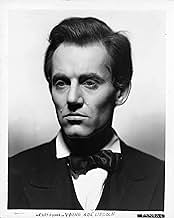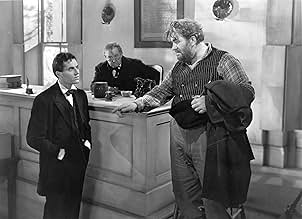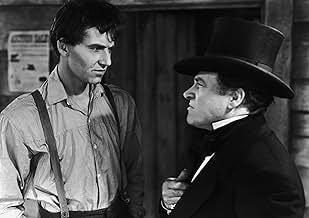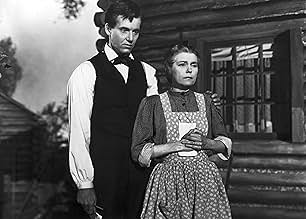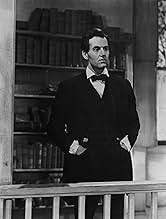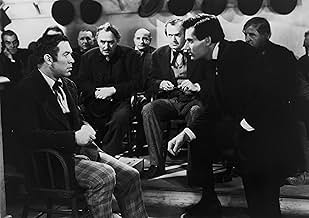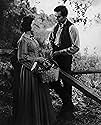Füge eine Handlung in deiner Sprache hinzuA fictionalized account of the early life of the American president as a young lawyer facing his greatest court case.A fictionalized account of the early life of the American president as a young lawyer facing his greatest court case.A fictionalized account of the early life of the American president as a young lawyer facing his greatest court case.
- Für 1 Oscar nominiert
- 6 Gewinne & 2 Nominierungen insgesamt
- Carrie Sue
- (Nur genannt)
- Man with Lynch Mob
- (Nicht genannt)
- Townsman Dancing at Party
- (Nicht genannt)
- New Salem Townsman
- (Nicht genannt)
- Carrie Sue
- (Nicht genannt)
- Peach Pie Baker
- (Nicht genannt)
- Loafer
- (Nicht genannt)
Empfohlene Bewertungen
Maybe that's why I love it. You can see Ford coming to terms with the grand, Griffithesque vision of America through its most complicated avatar, Lincoln. Ford's love for his country was more like Lincoln's than Griffith's, anyway: like Lincoln, he acknowledged the genius of the democratic experiment, but he was also aware of its dangers: mob rule and self-satisfaction. YML's greatest scenes are all about this.
First, there's the local parade Abe attends, surrounded by yahoos whom he loves but also sees for what they are. (We see him in another scene accepting a legal case from one of these -- and warily biting the coin offered him for a retainer.) Veterans of the recent War of 1812 and Indian Wars march through; the crowd is wild for them, Abe merely respectful.Then a agon of old men in tricorners is pulled through the parade route. No one seems to know who they are. Lincoln quietly informs his friends that they are veterans of the War for Independence -- and gravely doffs his stovepipe hat. His friends, mildly ashamed (it appears) of their prevous jingoistic glee, follow suit, and stand silent and hatless as the old men pass.
Then the mildly ludicrous plot -- about two brothers accused of another man's murder -- kicks in, and Abe goes to work. The scene where he confronts a lynch mob, putting his foot up against the log they're using for a battering-ram against the jailhouse door, is a classic by any standard. But note how Abe talks to the mob on its own level while remaining, in spirit, resolutely on his own higher plane. After appealing to their macho impulses by offering to "lick any man here," he delivers a house-divided speech that soothes their savagery and leaves them confused and irresolute. "Dontcha wanna put that log down now, boys?" he asks when they have been flummoxed by his eloquence. "Ain't it gettin' a mite heavy?"
Throughout Ford indulges in shameless historical foreshadowings that would have made Stephen Vincent Benet blush. Abe meets Mary Todd and Stephen Douglas; he rides down a dirt road with a bumpkin who's playing a new tune called "Dixie" on a jaw-harp. "Kinda makes you feel like marchin'!" says the bumpkin, as he and Abe ride through a muddy patch in the road.
The ending is impossible to describe without inviting derision, but I swear to you, it works. Having won his case, Lincoln allows as how he might take a walk -- "maybe to the top of that hill." As he trudges on, the skies send down rain and lightning -- and Abe seems to know what this is a prelude to.
I acknowledge the superiority of the great Ford films that came after, but I will always have a special place in my heart for "Young Mr. Lincoln." Independence Day (the federal day of observance, not the movie) is coming; you could do far worse than to watch this great film before the barbecue.
In this movie Henry Fonda shows that he has a very good grasp of how to present humor. It is an aspect of him that has been lost over the years. When he is telling stories and jokes he has the timing down perfect. There is a sequence in the trial that had me laughing quite hard. He shows this gift again in The Lady Eve in 1940.
The ending by John Ford is absolutely brilliant with Henry Fonda going to the top of a hill and in the distance a tremendous storm symbolic of the Civil War. He goes forward into history. The movie is fiction but the insight into Lincoln is tremendous. Definitely worth seeing again.
Excellent performance from Henry Fonda as idealistic ,traveller Springfield solicitor , he was to star regularly for John Ford from this movie , as ¨Grapes of wrath" ,"My darling Clementine" , and "Fort Apache¨. Besides, sterling acting by Alice Brady as grieved mother , she was a great actress from the silent cinema to early sound , but this one resulted to be her last movie because she early died due to cancer . The Lincoln's deeds developing make for skillfully appealing entertainment. His portrayal shows a nostalgic longing for things past and old values and describes his goodness , uprightness and willful . Lincoln , like John Ford, was a straightforward man who never varied the ideals of his youth . This American masterpiece is correct on both counts , as splendid biography and as magnificent drama.
Other biographies about Abraham Lincoln are the following ones : 1) ¨Abraham Lincoln¨(1930) by D. W. Griffith with Walter Huston , Una Merkel, talking about his birth until his assassination ; 2) ¨Abe Lincoln in Illinois¨(1940) by John Cromwell with Raymond Massey , Ruth Gordon, concerning similar events to Ford's film throughout his career as a lawyer 3) TV version titled ¨Gore Vidal's Lincoln¨ with Sam Waterston and Mary Tyler Moore as Mary Todd. And, finally, a recent version by Steven Spileberg with Daniel Day Lewis and Sally Field.
With the world plunging into a war that America dreaded, but knew it would be drawn into, Abraham Lincoln was much on people's minds, in 1939, as someone who had faced the same dilemma in his own life, and had triumphed. On Broadway, Robert E. Sherwood's award-winning "Abe Lincoln in Illinois", with Raymond Massey's physically dead-on portrayal, was playing to packed houses (it would be filmed in 1940). Carl Sandburg's continuation of his epic biography, "Abraham Lincoln: The War Years", was published, and quickly became a best seller. President Roosevelt frequently referred to Lincoln in speeches, and the Lincoln Memorial, in Washington, D.C., became the most popular landmark in town (a fact that Frank Capra made good use of, in "Mr. Smith Goes to Washington").
All this was not lost on Darryl F. Zanuck, at 20th Century Fox; as soon as he read Lamar Trotti's screenplay of Lincoln's early days as a lawyer, he designated it a 'prestige' production, and assigned John Ford to direct, and Henry Fonda, to star.
Fonda did NOT want to play Lincoln; he felt he couldn't do justice to the 'Great Emancipator', and feared a bad performance would damage his career. Even a filmed make-up test, in which he was stunned by how much he would resemble Lincoln, wouldn't change his mind. According to Fonda, John Ford, whom he'd never worked with, cussed him out royally, at their first meeting, and explained he wasn't portraying the Lincoln of Legend, but a young "jackanape" country lawyer facing his first murder trial. Humbled, Fonda took the role. (John Ford offered a different scenario of the events, but the outcome was the same!) Obviously, they found a chemistry together that worked, as nearly all of their pairings would produce 'classics'.
Unlike the introverted, melancholia-racked Lincoln of "Abe Lincoln in Illinois", Ford's vision was that of a shy but likable young attorney, who made friends easily, and misses the mother he lost, too young (resulting in a bond with a pioneer mother that becomes a vital part of the story). Injustice riles him, and he speaks 'common sense' to quell violence, interlaced with doses of humor. Both productions play on Lincoln's (undocumented) relationship with Ann Rutledge; in Ford's version, the pair are truly in love, and committed to each other. After her death, Lincoln would frequently visit her grave, to share his life with her 'spirit' (a theme Ford would continue in "She Wore a Yellow Ribbon").
A murder trial is the centerpiece of the film, and shows the prodigious talents of the star and director. Fonda deftly portrays Lincoln's inexperience, yet earnest belief in justice tempered with mercy, and Ford emphasizes the gulf between the big-city 'intellectuals' (represented by pompous D.A. Donald Meek, and his slick 'advisor', Stephen Douglas, played by a young Milburn Stone), and the informal, rule-bending country sense of Lincoln. With Ford 'regular' Ward Bond as a key witness, the trial is both unconventional, and riveting.
With the film closing as Lincoln strides away into the stormy distance, and his destiny (dissolving into a view of the statue at the Lincoln Memorial), audiences could take comfort in the film's message that if a cause is just, good would ultimately triumph.
"Young Mr. Lincoln" is a truly remarkable film, from an amazing year!
Wusstest du schon
- WissenswertesJohn Ford and producer Darryl F. Zanuck fought an extended battle over control of the film. Ford even had unused takes of the film destroyed so the studio could not insert them into the movie. One scene that Ford insisted on cutting was a scene where Lincoln met his future assassin, a very young John Wilkes Booth.
- PatzerLincoln is shown playing "Dixie" on a Jew's harp. That portion of the film is ostensibly set in the year 1837, but most reliable sources indicate that "Dixie" wasn't written, publicly performed nor published before 1859. During the Civil War, Lincoln was known to be partial to the tune (it was almost as popular in the North in the 1860s as in the South), but it's unlikely he would have heard it in the 1830s.
- Zitate
Abe Lincoln: [cross-examining Cass] J. Palmer Cass.
John Palmer Cass: Yes, sir.
Abe Lincoln: What's the "J" stand for?
John Palmer Cass: John.
Abe Lincoln: Anyone ever call you Jack?
John Palmer Cass: Yeah, but...
Abe Lincoln: Why "J. Palmer Cass?" Why not "John P. Cass?"
John Palmer Cass: Well, I...
Abe Lincoln: Does "J. Palmer Cass" have something to hide?
John Palmer Cass: No.
Abe Lincoln: Then what do you part your name in the middle for?
John Palmer Cass: I got a right to call myself anything I want as long as it's my own name!
Abe Lincoln: Well then if it's all the same to you, I'll call you Jack-cass.
[Roar of laughter from spectators]
- VerbindungenFeatured in The Blue Bird (1940)
- SoundtracksThe Battle Cry of Freedom
(1862) (uncredited)
Written by George Frederick Root
Played during the opening credits and sung by an unidentified chorus
Top-Auswahl
Details
Box Office
- Budget
- 1.500.000 $ (geschätzt)
- Laufzeit
- 1 Std. 40 Min.(100 min)
- Farbe
- Seitenverhältnis
- 1.37 : 1

